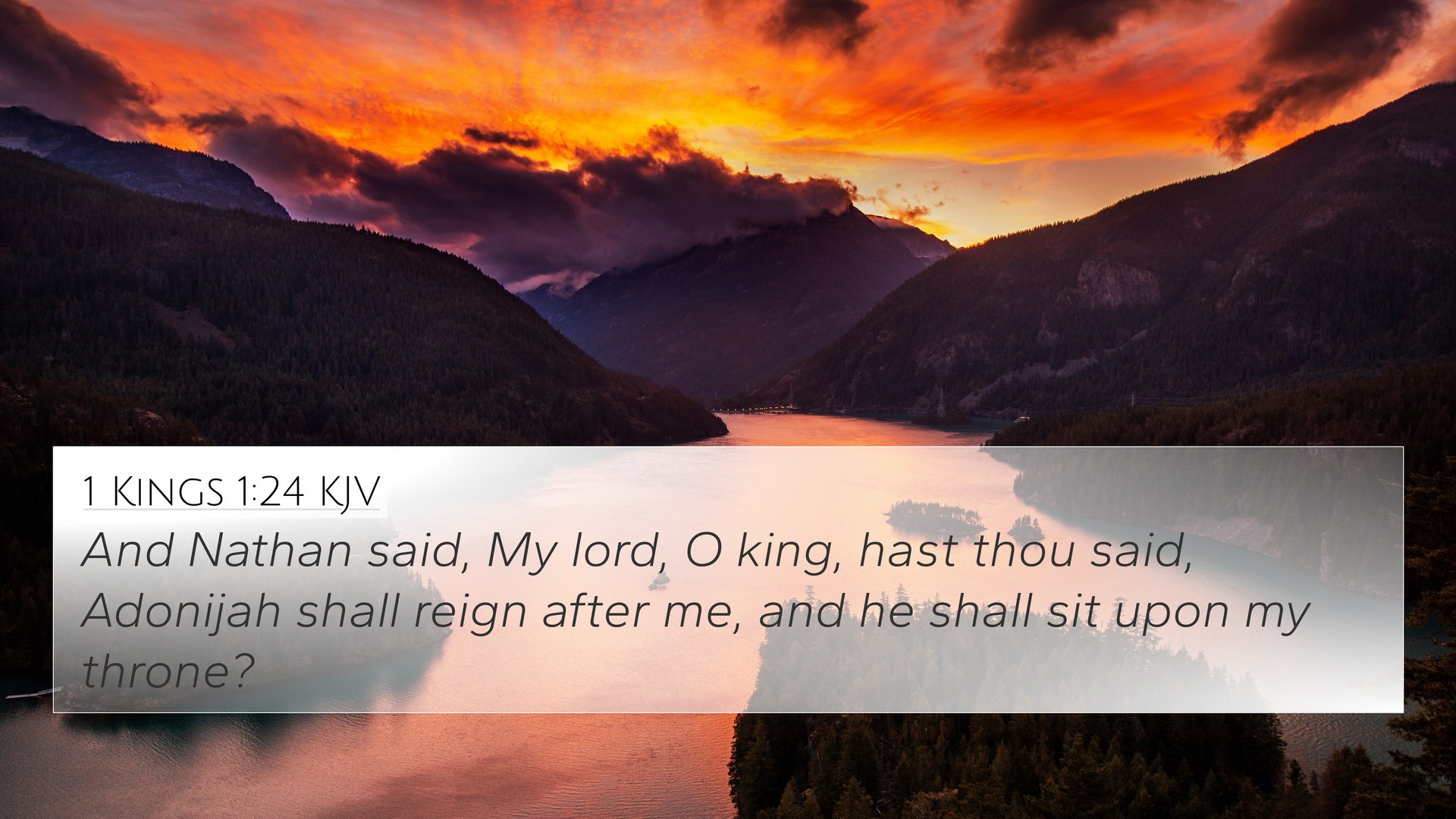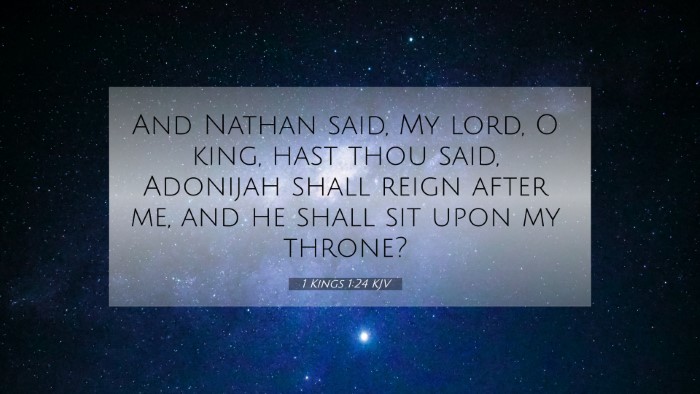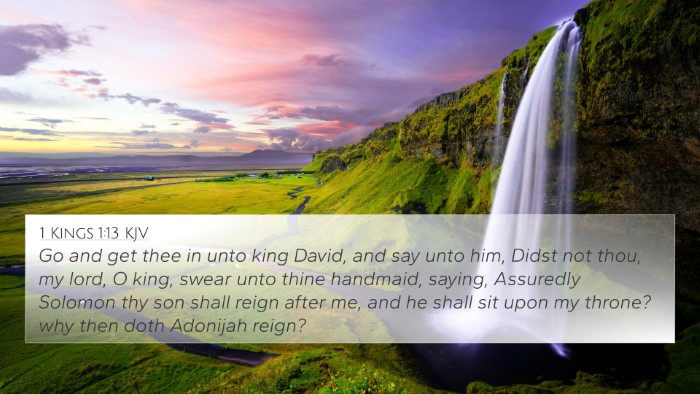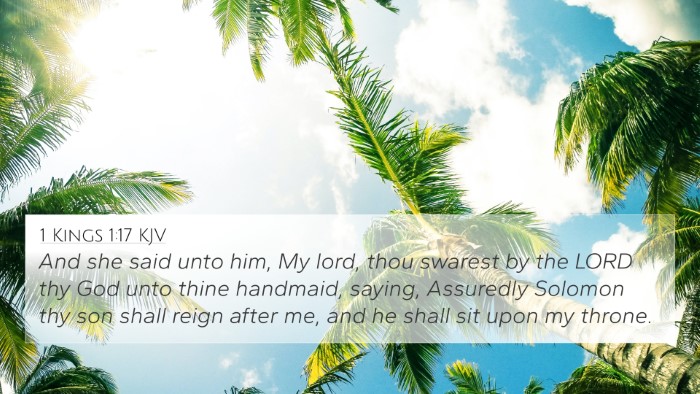Understanding 1 Kings 1:24
Verse: 1 Kings 1:24 - "And Nathan said, My lord, O king, hast thou said, Adonijah shall reign after me, and he shall sit upon my throne? for he is gone down this day, and hath slain oxen and fat cattle, and sheep in abundance, and hath called all the king's sons, and the captains of the host, and Abiathar the priest: and, behold, they eat and drink before him, and say, God save king Adonijah."
Summary of Meaning
This verse occurs at a critical juncture in King David's reign, where the succession of the throne is hotly contested. Nathan the prophet confronts King David about Adonijah's actions, highlighting the brewing tension and laying the groundwork for significant events ahead.
Key Themes
- Succession and Authority: The struggle for power, as shown by Adonijah's proclamation, raises questions about rightful authority.
- The Role of Prophecy: Nathan acts as God's messenger, showcasing the importance of divine guidance in political matters.
- Public Acknowledgment: Adonijah's public feast is an attempt to legitimize his claim to the throne.
- Divine Will versus Human Ambition: The contrast between God’s plan and human schemes becomes evident in Nathan’s advocacy for Solomon.
Commentary Insights
Matthew Henry: Henry asserts that Nathan serves as a vital guardian of God’s purposes. He signifies a prophetic voice aimed at correcting King David’s neglect of proper succession—guarding the future of Israel against human error.
Albert Barnes: Barnes emphasizes Nathan's boldness. He was unafraid to confront the king, underlining the necessity of truth-telling in leadership. The prophet's role in Israel is not merely to foretell but to interpret God's will amidst turmoil.
Adam Clarke: Clarke highlights the cultural implications of feasting in ancient Israel; it served as a means to validate leadership. Adonijah's action reflects a misunderstanding of rightful kingship, contrasting with Solomon’s divinely ordained future.
Cross References
1 Kings 1:24 connects with several significant biblical themes through various verses:
- 2 Samuel 7:12-13: God's promise to David regarding his lineage, emphasizing Solomon's future reign.
- 1 Chronicles 28:5: David reveals his chosen successor, Solomon, illustrating divine choice over human desire.
- 1 Kings 1:5: The introduction of Adonijah's ambition to claim the throne, setting the stage for the conflict.
- Proverbs 16:9: Insight into human plans versus divine intervention; a reminder of God's control over kings and kingdoms.
- Matthew 20:26-28: A New Testament reflection on leadership and servanthood, paralleling the themes of rightful authority.
- Romans 13:1: The New Testament teaching on the authority of rulers, aligning with God's sovereignty over political systems.
- Psalms 2:1-6: A prophetic psalm about the Lord's anointed; shedding light on the importance of recognizing God’s authority in kingship.
Bible Cross-References and Connections
This verse plays into a broader tapestry of interconnected scriptures that facilitate a deeper understanding of royal succession and divine authority:
- Esther 3:2: A thematic exploration of loyalty and betrayal in royal courts.
- Luke 1:32-33: The acknowledgment of Christ’s everlasting kingdom links back to the lineage through David's house.
- Jeremiah 23:5: A prophetic promise of a righteous branch from David’s lineage, connecting the Old Testament hope to the New Testament fulfillment.
Conclusion
1 Kings 1:24 is pivotal in understanding the complexities of leadership and prophetic intervention in biblical history. Analyzing this verse within the context of its cross-references unveils rich layers of meaning, showcasing the intricate relationships between various Bible passages. These cross-referencing tools serve to illuminate our understanding of God's overarching plan in governance, authority, and the covenantal lineage that leads to Christ.
Additional Tools for Study
- Utilize a Bible concordance for deeper exploration of themes surrounding kingship.
- Engage in cross-reference Bible study to enrich understanding of related verses.
- Consult a cross-reference guide to help identify thematic connections between Old and New Testaments.
Related Studies
For further exploration, consider how these themes connect and resonate throughout scripture, such as:
- Identifying connections between Old and New Testament: How royal themes transition from the era of kings to the Kingdom of God.
- Comparative study of Pauline epistles: Understanding leadership in the early church context.





